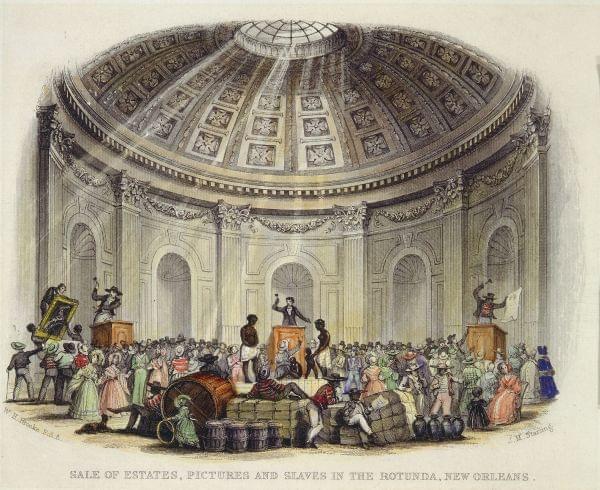‘Purchased Lives’ Exhibition at IL Holocaust Museum; The Challenges At DCFS; Sears’ Radical Past

Illinois Holocaust Museum
On The 21st: We’ll get a tour of the Illinois Holocaust Museum’s newest exhibit. It focuses on the dangerous journeys that slaves made after they already got to America. Plus, we'll revisit our conversation about the radical past of the Sears catalog and how they helped disrupt segregation in the Jim Crow era. But first, The Department of Children And Family Services has had 11 directors in the last 16 years. And a new report from their inspector general says that more children are dying, even after DCFS has already checked up on them.
When you hear "slave trade," often what comes to mind is the cruel and dangerous journey when Africans were brought by boat to this country. But you may not think about the journeys slaves made once in America, no less cruel and no less dangerous, and sometimes merely by foot. This domestic slave trade is one explored in a new exhibition at the Illinois Holocaust Museum and Education Center. It's called Purchased Lives.
We had a chance to visit recently and were taken on a tour by the museum's chief Arielle Weininger.
"Unfortunately the topic of slavery...is something our country has not dealt with...the ramifications of it can still be felt, Chicago being one of the major centers of the #GreatMigration."
— The 21st (@21stShow) February 28, 2019
- @ihmec curator Arielle Weininger
More on #PurchasedLives https://t.co/KQcb90gSlJ pic.twitter.com/kCAL4gbwm9
Plus-
The Department of Children and Family Services (DCFS) is responsible for protecting our most vulnerable residents. And since 2013, the number of Illinois children who have died while being in contact with DCFS in some way has stayed at about 100. That number is troubling enough.
But there’s another death rate that’s increasing and that’s the kids who died after DCFS had already investigated a case. In other words, the department looked into possible abuse or neglect, closed the case, and a child still lost her life.
We learned about this story through Hannah Meisel, who reported on this for The Daily Line. She joined us from Springfield.
Also on the line was Andrea Durbin, she’s CEO of the Illinois Collaboration On Youth. They represent 85 providers across the state that focus on children and youth.
We reached out to the Department of Family and Child Services. They declined our invitation but sent us a statement:
- "In the past several months, we’ve taken significant steps to better protect Illinois children including reducing caseloads, implementing new technology, building collaboration with the Department of Human Services, and moving higher-risk cases back to DCFS from private agencies. We will continue to review our policies and practices to ensure we are delivering needed services effectively to our most vulnerable residents. Governor Pritzker has already made clear that funding DCFS services will be a priority, approving 126 additional staff and technology upgrades after years of budget constraints. We are committed to working with the new administration to better serve our children and families."
"On the public sector side, I'll say our workforce is struggling...when you think about turnover rates, think about it from the point of view of a child or family. "
— The 21st (@21stShow) February 28, 2019
- @durbinandrea @ICOYouth
And-
Back in October, Sears announced it was filing for bankruptcy and closing one hundred and forty two of its stores that were losing money. At that time, a lot of people were talking about the loss of jobs, the impact on nearby real estate and what this means for the future of big retail.
There was also a Twitter thread started by Louis Hyman, professor at Cornell University, that sparked a lot of interest and got us thinking about another side of Sears: Not its softer side. But its radical one.
Hyman tweeted: "In my history of consumption class, I teach about Sears, but what most people don't know is just how radical the catalogue was in the era of Jim Crow."
So what can we learn from the way Sears was a power disrupter?
Louis Hyman joined us on the line from New York. He’s an economic historian and the Director of the Institute for Workplace Studies at the School of Industrial and Labor Relations at Cornell University.
Here is a video I made about #Sears and contesting white supremacy a few years ago for our history of capitalism class (it is towards the end). Also #JohnHenry and #IdaWells. https://t.co/tA67sfov4b
— Louis Hyman (@louishyman) October 15, 2018
